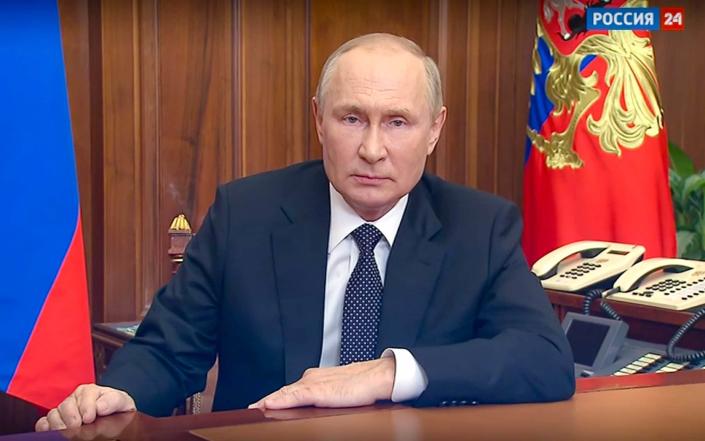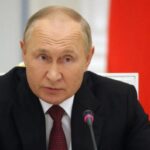
The Russian stock market tumbled on Wednesday after Vladimir Putin ordered his country’s first mobilisation since the Second World War and warned the West he was prepared to use nuclear weapons.
Mr Putin’s bellicose warning sent the Moscow Stock Exchange’s MOEX index plunging by as much as 10pc, marking the second day in a row of big losses.
The MOEX had already fallen by 9pc on Tuesday following the president’s threat to annex parts of Ukrainian territory currently held by his country’s troops, using what have been denounced as “sham” referendums.
The escalation sent shockwaves through gas markets as well, with the European benchmark price jumping 8pc higher to about €210 per megawatt hour.
Sterling and the euro weakened as investors took flight to the dollar. The US currency hit a 20-year high against a basket of six other major currencies on Wednesday morning.
Russia’s stock market has already taken a severe beating in the past year, with the MOEX roughly halving from around 4,000 points a year ago to just over 2,000 today.
Susannah Streeter, a senior investment and markets analyst at Hargreaves Lansdown, said: “Fears have ratcheted up that there will be a sharp escalation of the war in Ukraine, sending investors scuttling into safe haven assets.”
Mr Putin on Wednesday morning declared “partial mobilisation,” calling up 300,000 reservists in a major escalation of his flagging invasion of Ukraine.
In a televised address, he also warned “those who are trying to blackmail us with nuclear weapons should know that the wind patterns can also turn in their direction”.
His threats came after a lightning Ukrainian counter offensive dealt Moscow’s troops their worst defeats since the early months of the conflict, retaking more than 10pc of the territory that Russia held.
It came as the EU quietly relaxed sanctions on transporting Russian coal and other commodities due to concerns about “energy insecurity around the world”.
New guidance issued by Brussels says member states can transfer certain goods, including coal and related products, “to combat food and energy insecurity around the world”.
Previously the guidance stopped EU operators from transferring coal and providing services – such as financing and insurance – to all shipments originating in Russia.
Brussels said a full ban on Russian coal remained in place for shipments into the EU and the rule changes only concern goods destined for third countries, which is what the bloc calls countries not in the EU or the broader free trade association.
A spokesman for the EU Commission, which issued the change, said the bloc was “fully committed to avoiding that its sanctions unduly impact trade in critical items to third countries around the globe”.
The change has sparked concerns from some member states, including Poland and Baltic nations, according to Bloomberg.
EU officials previously eased sanctions on some Russian food products following claims by Moscow that the restrictions were behind soaring food prices internationally and in poorer countries.
However, diplomats fear the latest update risks going beyond food security commitments and may instead water down sanctions on Russian commodities.




